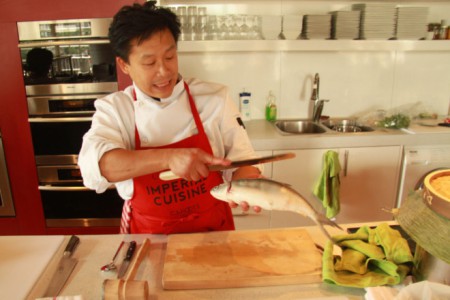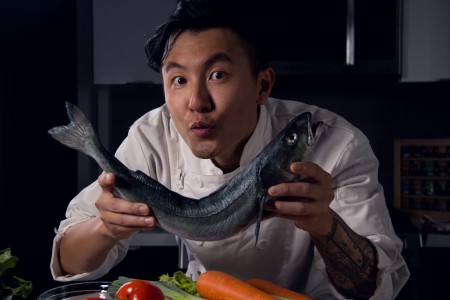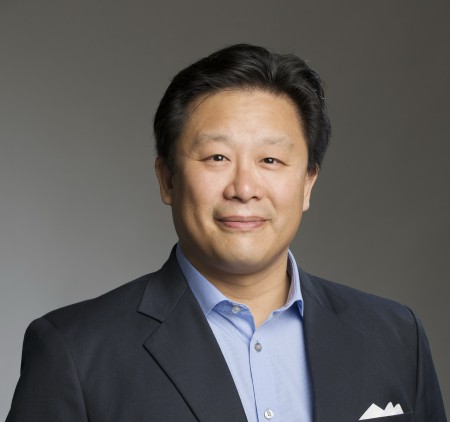
A Taste of Empire
The Globe and Mail once suggested that if one cooking demonstration provides food for thought, then A Taste of Empire should be considered a great success. The play begins with Chef Jovanni prepares “rellenong bangus” (stuffed milkfish) while taking the audience on a delectable journey about imperialistic desires and colonialist themes in Philippine history. Ricepaper interviewed Jovanni and Derek Chan in anticipation of their upcoming play.
Derek Chan is a theatre maker and translator who was born and raised in colonial Hong Kong, where he witnessed the Handover of his home from one owner to another. In his teenage years, Derek lived in Norway for two years before relocating to Vancouver to study theatre. Jovanni Sy is Artistic Director of Gateway Theatre. He was born in Manila and raised in Toronto where he was based professionally for twenty years as an actor, playwright, director, and dramaturg. Ricepaper interviewed Derek and Jovanni.

Derek Chan
You’re born and raised in colonial Hong Kong. What are your personal thoughts about the situation in Hong Kong, particularly with the Independence movement?
Derek: I left Hong Kong in 2003 when I was 16, almost 17. My entire family still lives there- parents, younger brother, extended family. From what I have seen last time I went back, and from what I gather, Hong Kong is changing- or rather, being changed- for the worse. Information on what the Chinese government has done since 1997 – from false autonomy to language encroachment, it is easy to imagine the Chinese government is aiming for a homogeneous country. That is a terrifying thought.
With the increasing clampdown on political freedoms and speech in most aspects of society in Hong Kong, how has this influenced your artistic endeavours and philosophy? Has this shaped your role in the performance of Taste of Empire?
Derek: I think the thing about Hong Kong that shaped my work and philosophy the most, is this feeling of perpetual in-between-ness, being claimed by one country or passed off to another. It never really felt like we were in control of our lives, or anything, really. From being sold to the British, to Japanese occupation during WWII, to even now that we are reclaimed by our supposedly “motherland”- Hong Kong always belonged to somebody else. And yet, we are a resilient bunch. We usually figure it out.
This play is performed in English and Cantonese. What was the process in translating Jovanni’s work from English to Cantonese? How long did it take?
Derek: The translating process was wonderfully fun and challenging. It’s sort of like solving a puzzle. Being a theatre-maker myself definitely helped. I really had to make good use of my playwriting and dramaturgy skills. You want to understand the world of the play. You want to understand the rules of the world in the play. You want to understand why one sentence comes before the next— and how to keep (most of) them in that order, especially between two languages with such different syntatical rules. And then, you’d want to use some of your performer skills as well: Does this roll off the tongue easily? Is it a playable/actable sentence? Does this joke work? Things like that. Great fun so far. I love puzzles.
Oh, and it is intriguing when things somehow just line up (a little suspiciously well) between the original and translated languages. And it is equally awesome to notice the differences. Not just technical differences, but also differences in imagery or philosophy. Say, common concepts that take a word or phrase to describe in one language, but a whole sentence in another. Sometimes it becomes a bit of an obstacle, in terms of translating, but most of the time, super cool. That’s why language diversity is important. Not just Cantonese. I am a firm believer in preserving all languages. It’s such a beautiful thing, isn’t it? Our basic human instinct to communicate, our need to understand one another and be heard.
The entire process… well, it’s still an ongoing process, but it began some time in the New Year [2016]. Probably January-ish…? Translation takes time, just like most things. Somebody at the translation residency we went to in Quebec said it takes at least ten drafts. There are things that you catch every pass you take at the script. Turns of phrases, tones, jokes, proper names, rhythm, timing- it is wonderful. I am lucky that Jovanni lives in the same city as I do, and he is such an approachable and generous playwright. It was definitely a big perk to be able to have quick exchanges about questions that come up during the process.
Some Chinese language scholars have said that unlike Putonghua Mandarin, the Cantonese dialect has variations which needs to be smoothed over and refined, particularly in the written text. Was it more challenging? Or in fact easier since you’re a native Cantonese speaker?
Derek: Variations is what makes a language beautiful. It was not particularly challenging writing in Cantonese, really. I enjoyed it. We learned how to write in standard written text in school, but that’s not how we speak normally. We speak Cantonese, and since I am working within the context of a theatrical script here, I try to write in the way the text should be spoken. Seems to make sense to me.
In terms of standardizing the writing… I mean, I don’t recall coming across a Cantonese word that I haven’t been able to find a written counterpart for. There are stand-in words that we use, which most people understand; and with a little research, some words do have a standard, if not a little archaic way to be written. Maybe I just haven’t put enough Cantonese to paper yet!
I’m not saying there isn’t a time or place to write in standard written Chinese- there definitely is. But I don’t think written Cantonese, or any other regional dialects, should be considered second-class or improper or non-standard either.
rice & beans theatre focuses on the creation, incubation and production of original performances. What were some of the highlights from the past? And what can we expect to see in the upcoming year(s) ahead?
Derek: We have learned a lot since Pedro and I started the company fresh out of school in 2010. There has been a lot of good times and a fair bit of tough times too. Things you learn to deal with as they come up. Things that happen, because they do.
When we first started, with no government funding at all, we decided doing a festival on Vancouver Island. A cast of six was a good idea, financially. Money was tight, but the tour was a blast. It was our first show out of town and I’ll always remember that period fondly as the time when we did it just because. A simpler time, a little less planning, a little less regard for consequences, a more invincible time.
Then one year we were blessed with an overabundence of drive and motivation, and decided to adapt the entire Orestia trilogy in one season. Three one-act adaptations. That was a lot of hats to wear, and a good lesson on understanding our capacity as artists and producers. I have to say, though, despite the piece of pie being quite the mouthful, I deeply enjoyed converting a banquet hall type of building into a performances space with a bunch of lamps, construction work lights, a strobe, and a few other things. Transforming spaces is cool.
One year we crammed 30… maybe 35 people in a studio that couldn’t have been bigger than 17 by 35 feet useable space. With a cast of… six, seven, all running their butts off, performing complex choreographed movements and text. Again a bunch of gear on stage, our composer, designer, stage manager… everybody. It was madness. A table that was – I kid you not – 15 feet wide, maybe 4 feet tall, a whale skeleton made of driftwood. That show was in the middle of Summer. By the end the performance space smelled very much like the inside of a ship.
Then we did a play in a boxing ring, which Pedro built. With actual sparring, and a scene in Spanish here and there. That show was the first time we remount a show- twice. We were presented at two different festivals, and it was quite a step forward for us. It felt like we finally grew up a tine little bit.
There was this last year when I won the Fringe New Play Prize, and Pedro’s show got in the Fringe lottery. So we did two Fringe shows in the same year. It was so, so much work. But- both Pedro and I are going to continue working on the plays. We felt that we have unfinished business with those two, especially because it was such a whirlwind creation and production process. They are both going to take quite a different direction. It is as if the Fringe were two big (and a little stressful) workshops, and now we are beginning to see where each of the projects want to go. Those two will likely be our main writing projects this year.
We recently had a residency at Progress Lab 1422 to develop a short piece on climate change. That piece was first made for another arts festival at the Firehall Arts Centre a few months back. It was great to be devising in the studio with Pedro again. I imagine we will keep working on the piece as well.

Jovanni Sy
Since becoming Artistic Director of the Gateway Theatre, you’ve brought in some diverse and intercultural productions, particularly with a Cantonese theme to them. How does Taste of Empire fit into the themes that is being showcased at Gateway?
Jovanni: First off, it’s so exciting to be a part of a original Canadian-made production that’s being presented in Cantonese. And it’s doubly exciting that Gateway gets to host the premiere of this new work. In the past, all of the Cantonese productions we’ve showcased have been from overseas. But here, we have a play performed in Cantonese where all of the creative personnel reside right here in Vancouver. How great is that? And the play has English and Simplified Chinese subtitles so it’s truly accessible to all.
Thematically, the issues we explore in 食盡天下/A Taste of Empire are relevant to all of us and fit in beautifully with the rest of the shows in Gateway season. In 食盡天下/A Taste of Empire we raise questions like What does it mean to be ‘good’? What are our responsibilities to each other? How are we all interconnected on this small planet of ours?
These are daunting questions but I’m proud to say we tackle them in an irreverrent and entertaining way (honest!). Watch our show and you’ll laugh a bit, you’ll think a bit, you’ll eat a bit.
Vancouver is a probably one of the more Cantonese-based, particularly “Hong Kong” Cantonese cities in North America, probably even the world. What types of audiences has Gateway drawn over the years? Have you been successful in bringing in more diverse audiences, particularly those bilingual audiences?
Jovanni: Our two iterations of the Pacific Festival have been tremendously successful in reaching out to new audiences – particularly the Chinese communities in Vancouver. Of course, Gateway is located in Richmond which is 50% Chinese-Canadian so attracting a new cohort of Chinese patrons is vital to our future.
Last September, over 3,000 patrons passed through our doors during the Pacific Festival – many of them were first-time visitors to Gateway. What touched me the most was hearing how generations of families enjoyed our programmes together. Older patrons were delighted to see world-class drama in their native Chinese. Meanwhile, the English surtitles allowed younger patrons to enjoy the shows alongside their parents and grandparents.
Along with the Pacific Festival, I’m also committed to programming works in our Signature Series (our English-language plays series) that reflect the Chinese diaspora. This October we are presenting the world premiere of King of the Yees, a wonderful play by Chinese-American playwright Lauren Yee that features an all Chinese-Canadian cast of five. So in October, we’ll see whether there’s any crossover between our Pacific Festival audience and our 食盡天下/A Taste of Empire audience into our English-language plays like King of the Yees.
Why did you settle with the theme of food and history? How did this idea originate and how did it evolve?
Jovanni: It’s been a pretty crazy juggling act! It’s basically been four weeks of very long hours – artistic director of Gateway by day and director of 食盡天下/A Taste of Empire by night. As for writing the original A Taste of Empire, the seed for the play started with a twenty-minute short piece I wrote on food and colonialism back in 2005 in Toronto for fu-GEN Asian Canadian Theatre. While I was running Cahoots Theatre Company, I developed the idea further until it evolved into its current form which premiered with Cahoots in Toronto in 2010. I basically did it as a one-off until Boca del Lupo asked me if I would revive it for their Micro Performance Series in 2014. It turned out to be a hit (or a micro-hit, at least) so we did it again in 2015.
The play begins with Chef Maximo’s cooking of a traditional Filipino dish Rellenong Bangus and takes us on a thought-provoking trip through history as he weaves stories of conquest, imperialistic desires, and colonialism through the construction (and deconstruction) of the dish. Why this particular dish? What is it to those who don’t know its history and significance to the story?
Jovanni: Why this dish? Three things. First, I picked Rellenong Bangus because it seemed like the perfect culinary metaphor for imperialism and colonialism – you take a fish that native to Asian waters; you evacuate its insides leaving only the skin intact; then you stuff it back with its own flesh sauteed in extremely European seasonings. And voilà, this Spanish/Asian hybrid is now one of the signature dishes of the Philippines.
Second, along with the metaphorical value, the dish is quite showy in its preparation. It take over an hour to make and there’s quite a bit of unusual technique involved in my recipe. So it’s got plenty of theatrical value to match its symbolism.
Finally, I picked it because as a Philippine-born Chinese artist, I have a natural affinity for the stories of my homeland.
As for its history … suffice it to say that A Taste of Empire posits that we are what we eat. And that everything we eat tells a story. And these days, that story is full of hidden and not-so-pleasant truths. Our show tries to uncover some of those truths while still satisfying your palate.
Courtesy of rice & beans theatre, Ricepaper is giving away a pair of tickets to A Taste of Empire. Post a comment about why you want to attend this production, and be entered to win a pair of tickets on Thursday, September 15th, 8.00pm.